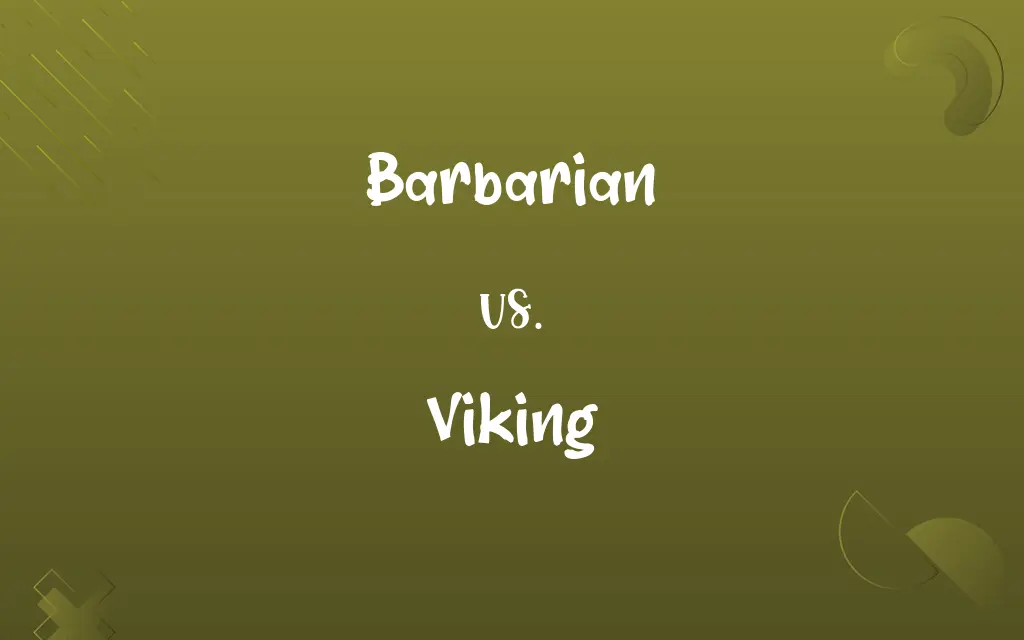Barbarian vs. Viking: Know the Difference

By Shumaila Saeed || Updated on December 25, 2023
Barbarian is an uncivilized or primitive person. Viking is a seafaring Scandinavian warrior from the 8th to 11th century.

Key Differences
The term "Barbarian" historically referred to a person perceived as uncivilized or primitive, often used by ancient civilizations like Rome to describe foreign invaders or societies outside their cultural norms. In contrast, "Viking" specifically identifies the seafaring warriors and explorers from Scandinavia during the Viking Age, noted for their raids and settlements across Europe and beyond.
Shumaila Saeed
Nov 29, 2023
Barbarians, in the broader sense, encompassed a wide range of tribes and cultures across different continents and eras, without a centralized identity or common origin. Vikings, however, were a distinct group from medieval Scandinavia, sharing a cultural and linguistic heritage, and known for their advanced seafaring skills and distinctive longships.
Shumaila Saeed
Nov 29, 2023
The concept of barbarism is often associated with a lack of sophistication in culture, technology, or social organization. Vikings, while sometimes portrayed as barbaric in historical narratives, actually possessed a complex society with rich traditions in art, literature (like sagas), and governance, showcasing a level of sophistication that contradicts the barbarian stereotype.
Shumaila Saeed
Nov 29, 2023
In popular culture, barbarians are often depicted as brutish, aggressive, and living in primitive conditions, a portrayal that can apply to various historical tribes from the Huns to the Goths. Vikings have also been popularly depicted as fierce warriors but are additionally recognized for their exploration, trade, and impact on the history of many European countries.
Shumaila Saeed
Nov 29, 2023
Both Barbarians and Vikings have been subjects of mythologization over time, with the term barbarian evolving to mean a brutish person in modern language, while Vikings have become emblematic of exploration, conquest, and the warrior spirit, often celebrated in modern Scandinavian cultures.
Shumaila Saeed
Nov 29, 2023
ADVERTISEMENT
Comparison Chart
Origin of the Term
Greek and Roman, meaning "foreign, uncivilized"
Old Norse, referring to sea expeditions
Shumaila Saeed
Nov 29, 2023
Cultural Context
Broad, various tribes and civilizations
Specific to Norse culture
Shumaila Saeed
Nov 29, 2023
Geographical Scope
Global, wherever perceived as uncivilized
Mainly Scandinavia and its expeditions
Shumaila Saeed
Nov 29, 2023
Historical Impact
Often seen as invaders or outsiders
Known for exploration and colonization
Shumaila Saeed
Nov 29, 2023
ADVERTISEMENT
Barbarian and Viking Definitions
Barbarian
A member of a community not belonging to one of the great civilizations.
The Romans often referred to the invading tribes as barbarians.
Shumaila Saeed
Nov 29, 2023
Viking
A Norse seafarer known for exploring and raiding.
The Viking longships were sighted along the coast, instilling fear in the villagers.
Shumaila Saeed
Nov 29, 2023
Barbarian
A person without manners or civilized customs.
He was dismissed as a barbarian due to his lack of etiquette.
Shumaila Saeed
Nov 29, 2023
Viking
A warrior from the Norse culture during the Viking Age.
The Viking chieftain led his men into battle with a fearsome reputation.
Shumaila Saeed
Nov 29, 2023
Barbarian
A warrior from a non-Greek or non-Roman culture.
The barbarians at the gate were fierce and relentless.
Shumaila Saeed
Nov 29, 2023
ADVERTISEMENT
Viking
An explorer from the Nordic regions during the early Middle Ages.
The Viking explorers were among the first Europeans to reach North America.
Shumaila Saeed
Nov 29, 2023
Barbarian
An uncultured or brutish person.
His behavior at the dinner party was considered barbarian.
Shumaila Saeed
Nov 29, 2023
Viking
A medieval Scandinavian adventurer.
As a Viking, he journeyed across the North Sea to new lands.
Shumaila Saeed
Nov 29, 2023
Barbarian
Someone living in a wild or primitive state.
Ancient explorers sometimes encountered barbarian tribes in uncharted lands.
Shumaila Saeed
Nov 29, 2023
Viking
A member of the seafaring people from Norway, Sweden, or Denmark.
The Viking settlers established a village in what is now Greenland.
Shumaila Saeed
Nov 29, 2023
Barbarian
A member of one of the non-Greek peoples in the ancient world, regarded by the ancient Greeks as culturally inferior.
Shumaila Saeed
Oct 19, 2023
Viking
One of a seafaring Scandinavian people who raided the coasts of northern and western Europe from the eighth through the tenth century.
Shumaila Saeed
Oct 19, 2023
Barbarian
A member of any of various peoples living outside the Roman Empire or not fully integrated into Greco-Roman civilization.
Shumaila Saeed
Oct 19, 2023
Barbarian
A member of a people considered uncivilized or culturally inferior by members of another people.
Shumaila Saeed
Oct 19, 2023
Viking
One belonging to the pirate crews from among the Northmen, who plundered the coasts of Europe in the eighth, ninth, and tenth centuries.
Of grim Vikings, and the raptureOf the sea fight, and the capture,And the life of slavery.
Shumaila Saeed
Oct 19, 2023
Viking
Any of the Scandinavian people who raided the coasts of Europe from the 8th to the 11th centuries
Shumaila Saeed
Oct 19, 2023
Barbarian
Relating to people, countries, or customs perceived as uncivilized or inferior.
Shumaila Saeed
Oct 19, 2023
Barbarian
An uncivilized or uncultured person, originally compared to the hellenistic Greco-Roman civilisation; often associated with fighting or other such shows of strength.
Shumaila Saeed
Oct 19, 2023
Barbarian
(derogatory) Someone from a developing country or backward culture.
Shumaila Saeed
Oct 19, 2023
Barbarian
A warrior, clad in fur or leather, associated with sword and sorcery stories.
Shumaila Saeed
Oct 19, 2023
Barbarian
A cruel, savage, inhumane, brutal person; one without pity or empathy.
Shumaila Saeed
Oct 19, 2023
Barbarian
(derogatory) A foreigner, especially with barbaric qualities as in the above definitions.
Shumaila Saeed
Oct 19, 2023
Barbarian
A foreigner.
Therefore if I know not the meaning of the voice, I shall be unto him that speaketh a barbarian, and he that speaketh shall be a barbarian unto me.
Shumaila Saeed
Oct 19, 2023
Barbarian
Of, or pertaining to, or resembling, barbarians; rude; uncivilized; barbarous; as, barbarian governments or nations.
Shumaila Saeed
Oct 19, 2023
Barbarian
Without civilizing influences;
Barbarian invaders
Barbaric practices
A savage people
Fighting is crude and uncivilized especially if the weapons are efficient
Wild tribes
Shumaila Saeed
Oct 19, 2023
Repeatedly Asked Queries
What era did Barbarians belong to?
The term "Barbarian" has been used since ancient times and applies to various periods, primarily ancient to medieval.
Shumaila Saeed
Nov 29, 2023
Were Vikings considered Barbarians?
Vikings were sometimes labeled as barbarians in historical texts, but they had a distinct, sophisticated culture.
Shumaila Saeed
Nov 29, 2023
Were Barbarians always hostile to Rome?
Not always; some barbarian groups had peaceful interactions or alliances with Rome.
Shumaila Saeed
Nov 29, 2023
Did Barbarians have a unified culture?
No, "Barbarian" is a broad term used for various groups, each with their own culture.
Shumaila Saeed
Nov 29, 2023
What religion did Vikings follow?
Vikings primarily followed Norse paganism before many converted to Christianity.
Shumaila Saeed
Nov 29, 2023
How were Viking societies structured?
Viking societies were structured with a hierarchy, including chieftains, warriors, and farmers.
Shumaila Saeed
Nov 29, 2023
What were Viking ships called?
Viking ships are famously known as longships.
Shumaila Saeed
Nov 29, 2023
Did Barbarians contribute to the fall of Rome?
Yes, Barbarian invasions were a significant factor in the decline of the Roman Empire.
Shumaila Saeed
Nov 29, 2023
Did Vikings discover America?
Vikings, led by Leif Erikson, are believed to have reached North America around 1000 AD.
Shumaila Saeed
Nov 29, 2023
Did Barbarians have any notable leaders?
Yes, notable barbarian leaders include Attila the Hun and Alaric the Visigoth.
Shumaila Saeed
Nov 29, 2023
Were Vikings skilled in navigation?
Yes, Vikings were renowned for their exceptional seafaring and navigational skills.
Shumaila Saeed
Nov 29, 2023
Did Barbarians have written languages?
Some barbarian groups had written languages, while others used oral traditions.
Shumaila Saeed
Nov 29, 2023
Did Barbarians have any artistic contributions?
Yes, many barbarian cultures had rich artistic traditions, including metalwork and jewelry.
Shumaila Saeed
Nov 29, 2023
What weapons did Barbarians use?
Barbarians used a variety of weapons, including swords, axes, and spears.
Shumaila Saeed
Nov 29, 2023
How did Barbarians impact European history?
Barbarians significantly influenced European history through invasions, migrations, and cultural interactions.
Shumaila Saeed
Nov 29, 2023
Did Vikings engage in trade?
Yes, Vikings were active traders and established trade routes across Europe and beyond.
Shumaila Saeed
Nov 29, 2023
What are some common Viking names?
Common Viking names include Erik, Olaf, and Freya.
Shumaila Saeed
Nov 29, 2023
What was the role of women in Viking society?
Women in Viking society had various roles, including managing households and sometimes participating in trade or exploration.
Shumaila Saeed
Nov 29, 2023
What was a typical Viking diet?
Vikings ate a diet rich in meat, fish, vegetables, and dairy products.
Shumaila Saeed
Nov 29, 2023
What languages did Barbarians speak?
Barbarians spoke a diverse range of languages, depending on their tribe and region.
Shumaila Saeed
Nov 29, 2023
Share this page
Link for your blog / website
HTML
Link to share via messenger
About Author
Written by
Shumaila SaeedShumaila Saeed, an expert content creator with 6 years of experience, specializes in distilling complex topics into easily digestible comparisons, shining a light on the nuances that both inform and educate readers with clarity and accuracy.






































































